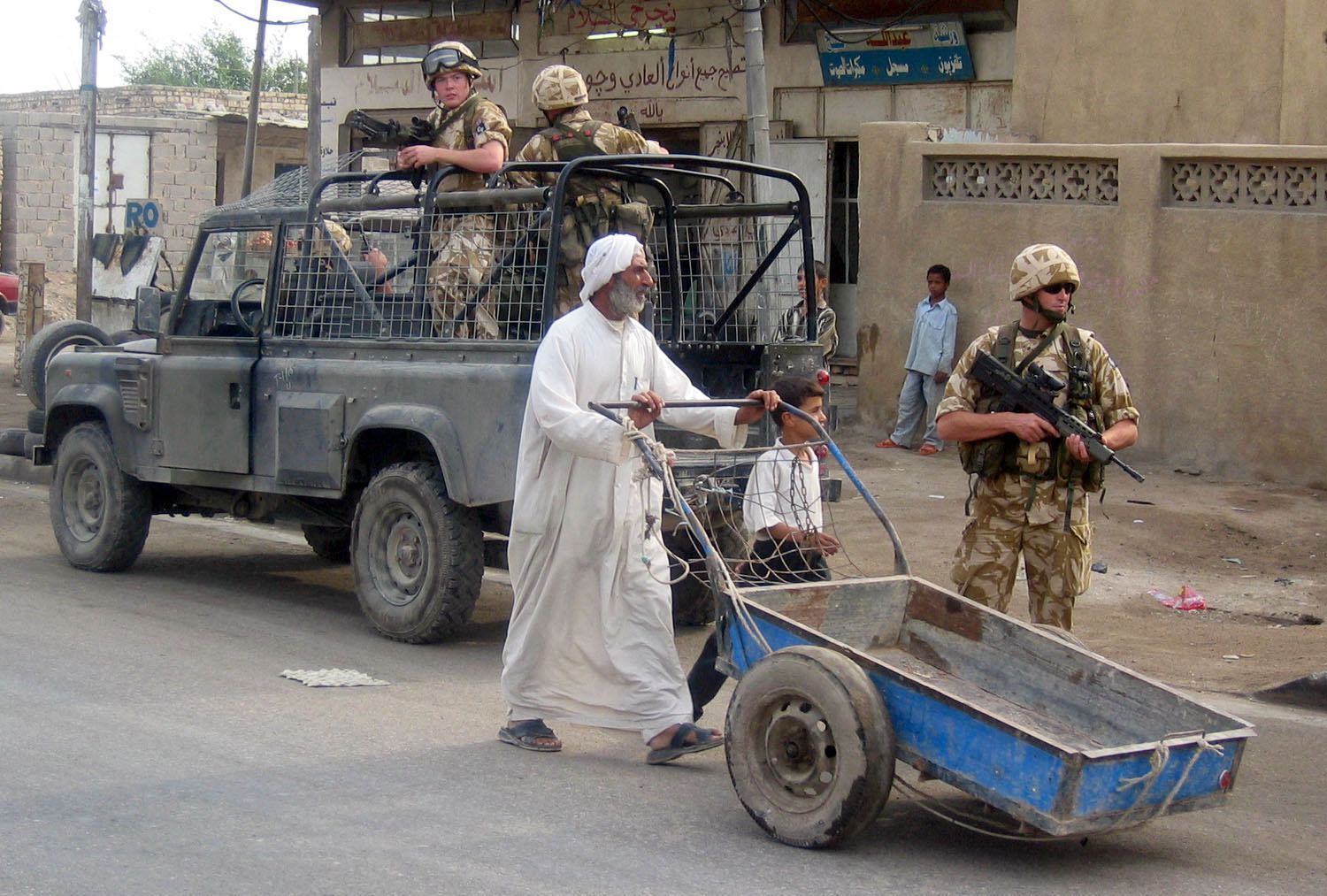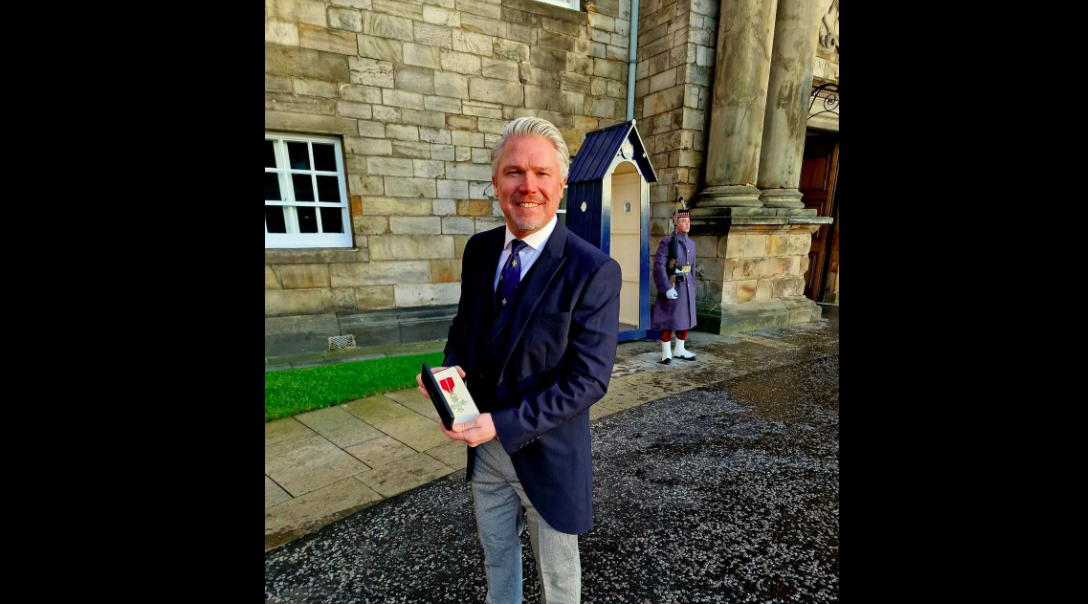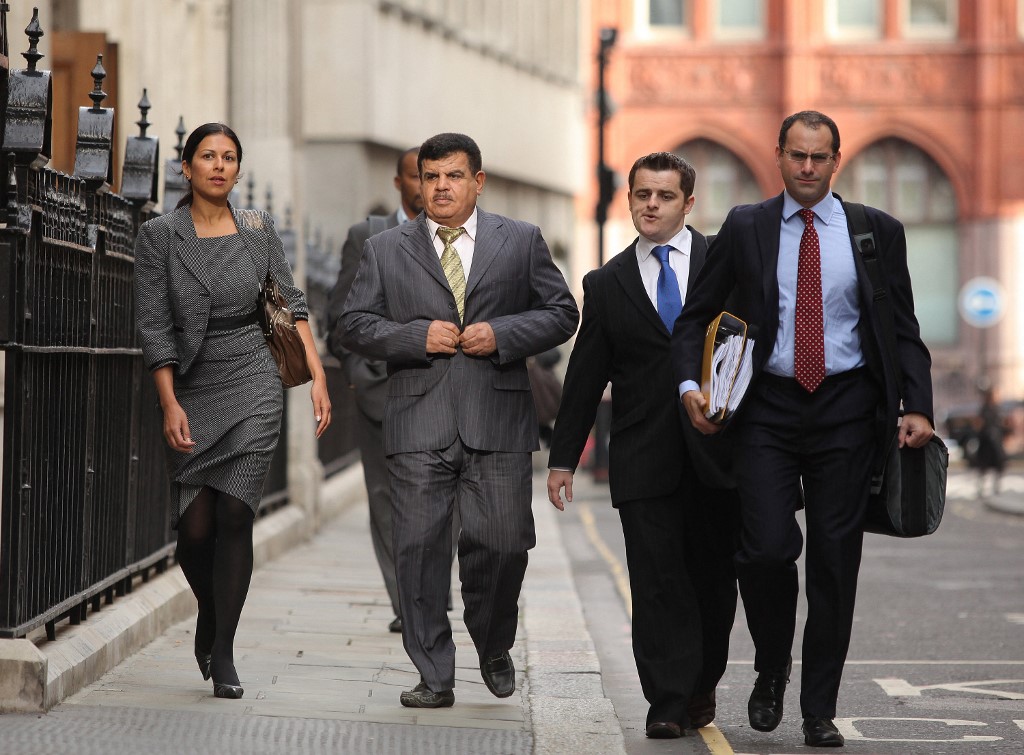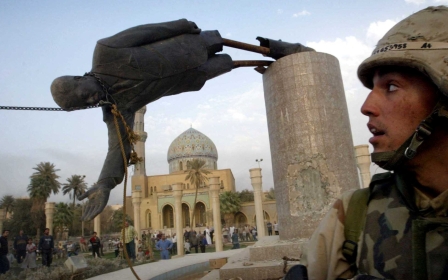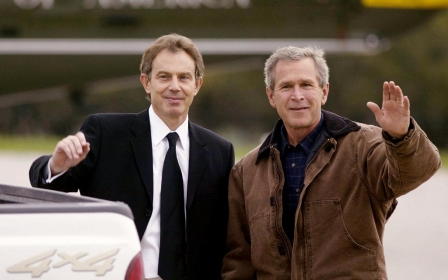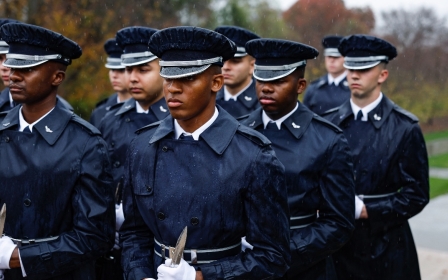British Army gave top honour to soldier who 'karate chopped and kicked' Iraqi detainees

The British military nominated a former soldier for one of the UK's highest honours for services to army boxing even after an official inquiry labelled him “shameful” for his involvement in assaulting Iraqi detainees in Basra in 2003.
Chris Roberts, a physical training instructor in the Queen’s Lancashire Regiment, was found to have karate chopped at least one detainee and “kicked probably three more” by the inquiry into the death of Baha Mousa and the abuse of other prisoners on a British base in the southern Iraqi city.
Roberts, who held the rank of Staff Sergeant at the time, denied involvement in the violence against Mousa and nine other detainees.
But in his report into the episode, published in 2011, Judge William Gage said he did not accept Roberts’ denial and found him to be a “very unsatisfactory witness”.
New MEE newsletter: Jerusalem Dispatch
Sign up to get the latest insights and analysis on Israel-Palestine, alongside Turkey Unpacked and other MEE newsletters
Gage said Roberts’ conduct represented a “shameful and serious breach of discipline” and “very substantial breaches of duty”.
“There can be no possible excuse or mitigation for what I find he did,” Gage said.
Roberts nonetheless remained in the army until 2020 and was promoted to the rank of major.
In 2021, he was awarded an OBE (Officer of the Order of the British Empire) medal, after being nominated by the army for “services to British army boxing”.
Since leaving the army, Roberts has built a career as a boxing official.
“It is unbelievable that the UK government want to reward this man for his service even though he was named in the report”
- Hadiya Marzooq, mother of Baha Mousa
In July last year, he was named development director at the International Boxing Association, the global body which officiates amateur boxing.
Roberts previously served as the head of Boxing Scotland for 17 months.
Neither Roberts nor the IBA responded to requests from Middle East Eye for comment. A spokesperson for Boxing Scotland said: "No comment".
The Ministry of Defence told MEE it had investigated allegations of detainees being assaulted and had found there was no case against Roberts.
The three-year inquiry into Baha Mousa’s death found that the 26-year-old hotel receptionist had been violently beaten to death in British military custody in September 2003.
It said British soldiers had inflicted "gratuitous violence" on nine other men detained with Mousa and had used five interrogation techniques banned by the British government and illegal under the Fourth Geneva Convention, which protects civilians from murder, torture, and brutality.
The inquiry found that the Ministry of Defence was guilty of "corporate failure" by failing to uphold its own rules relating to the interrogation of detainees.
Gage added that the abuse meted out by the first Queen's Lancashire Regiment was not a one-off but dismissed claims there was a “culture of violence” within the unit.
The inquiry followed court martials that led in 2007 to Corporal Donald Payne becoming the first British soldier in the army’s history to be charged with war crimes.
Payne pleaded guilty to the inhumane treatment of Mousa and was jailed for one year, but he was cleared on charges of manslaughter and perverting the course of justice.
Six other soldiers faced court martials with Payne but were acquitted.
Those cleared included Colonel Jorge Mendonca, the commander of the 1st Battalion of the Queen's Lancashire Regiment and the highest-ranking serving officer in the British Army to face court martial. Mendonca quit the army soon afterward.
Roberts, whose duties in Basra included acting as Mendonca’s personal protection officer, was not one of the seven soldiers who faced a court martial.
But the inquiry found he had “taught an arrest and restraint technique which was very similar to the method of restraint used by Payne on Baha Mousa”.
Gage described the technique as “kneeling on [the prisoner’s] back and pulling his arms behind him”.
In evidence to the inquiry, Roberts said he had taught arrest and restraint techniques, including putting a knee in the back of a prisoner when they are face down on the ground as part of the battalion’s pre-deployment training.
In his final report, Gage said several soldiers alleged that Roberts was involved in violence against the detainees. But he said he had found some of these soldiers to be poor or unreliable witnesses.
Gage concluded: “I do not accept his denial that he was not involved in any violence. I find that [Staff Seargeant] Roberts karate chopped at least one detainee… and kicked probably three.”
Roberts told the inquiry he had visited Baha Mousa’s family after his death in his capacity as Mendonca’s personal bodyguard.
Hadiya Marzooq, the 72-year-old mother of Baha Mousa, told MEE it was unbelievable that Roberts had been promoted and rewarded for his work in the army despite being named by the inquiry.
She said her husband had gone to the British base every day while Mousa was detained and had been told he would be released soon.
"But they released his body to us in a coffin instead. It was a big loss for us," said Marzooq.
“I’ve been deprived of seeing my son, Baha, because of the brutal torture and treatment by the British army. It is unbelievable that the UK government want to reward this man for his service even though he was named in the report. What do they mean by service?”
Asked why Roberts had been nominated for an OBE, the Ministry of Defence spokesperson told MEE: “State honours are awarded to individuals who go above and beyond in fulfilling their duties. In this case, Major Roberts was awarded an OBE for his recent services to sport across the armed forces.”
The spokesperson added: “We conducted a thorough investigation into allegations of detainees being assaulted in Iraq, and there was found to be no case against Major Roberts.”
The spokesperson did not respond to further questions asking for more details about the investigation, and whether it predated Gage's report or was carried out later.
In 2008, the Ministry of Defence agreed to pay £2.83 million in compensation to Baha Mousa's family and nine other men after the MoD admitted to "substantive breaches" of the prohibition of torture and the right to life in the European Convention on Human Rights by the British Army.
Almost 20 years after the invasion of Iraq, British forces continue to face questions over alleged war crimes and abuses committed during the war and the occupation, and the concurrent conflict in Afghanistan.
In 2020, the International Criminal Court found there were "reasonable" grounds to believe British forces had committed the war crimes of “willful killing, torture, inhuman/cruel treatment, outrages upon personal dignity, and rape and/or other forms of sexual violence" against Iraqi civilians in detention.
But it dropped a preliminary investigation, citing the UK’s own investigations into the conduct of its troops during the conflicts.
Last year, it was reported that the British military did not prosecute 94 percent of complaints it received concerning the mistreatment of civilians in Afghanistan in 2010 and 2011.
Iain Overton, the executive director of Action on Armed Violence, which obtained the data, said that Roberts’ promotion within the army and nomination for an OBE was indicative of a culture of cover-ups and denial within the British military.
“There is an institutional and evidenced truth that the British military doesn't like to investigate the worst of their troops' failures - a truth borne out by statistical evidence," Overton told MEE.
"And when abuses are found, they are neither investigated nor factored into the offender's career path.
"Everyone deserves a second chance, but for that to be given without anyone being punished or the harm even acknowledged, strikes me as an acute failure of justice.”
Additional reporting by Azhar Al-Rubaie from Basra, Iraq.
Middle East Eye delivers independent and unrivalled coverage and analysis of the Middle East, North Africa and beyond. To learn more about republishing this content and the associated fees, please fill out this form. More about MEE can be found here.


